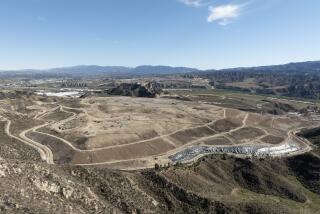2nd La Conchita Landslide Trial Set to Begin
- Share via
Disaster struck on the afternoon of March 4, 1995. Rainfall had been heavy for days, and the 600-foot-high bluff above La Conchita, a modest beach-side community a few miles north of Ventura, was beginning to crumble.
Suddenly, a slab of mountain the size of four football fields broke free like a giant mud glacier. It rumbled down from the height of a 60-story building and smashed into the Vista del Rincon neighborhood.
In an instant, much of the town was hit with 600,000 tons of rock and mud, the event recorded live by film crews and indelibly stamped into the memories of residents. Nine houses were destroyed, dozens more were damaged, and about 100 houses--two-thirds of the town--were evacuated.
La Conchita today is still posted with landslide hazard warnings, and mounds of earth remain in people’s backyards.
Almost four years later, many folks have moved back; others have moved on. Most began pointing fingers, first at Ventura County, then at the farm atop the bluff. This week, the disaster moves into the courtroom, as the second of two major lawsuits comes to trial.
Attorneys for 149 residents want at least $20 million in damages from La Conchita Ranch Co., whose farming practices they blame for causing the slide. Lawyers for the farm deny the allegations and claim the slide was a natural disaster, unfortunate but no one’s fault.
The first lawsuit was resolved in June 1997, when 112 residents settled with the growers.Terms were not disclosed and there were no admissions of guilt, but residents received an unspecified amount of money in damages. The settlement, however, contained no provisions to fix the slippery slope, attorneys said.
The way that suit was handled angered others in the small community, who banded together and filed a second suit a month after the first was settled.
That case is scheduled to begin opening arguments Wednesday before Ventura County Superior Court Judge Henry J. Walsh.
Robert L. Brace, a Santa Barbara attorney for the second group of plaintiffs, said the hillside gave way because careless irrigation practices at La Conchita Ranch Co. saturated the soil.
La Conchita Ranch Co. has grown thousands of avocado and citrus trees on 688 acres above the town since 1975.
A low-volume-drip irrigation system was replaced in 1984 with an irrigation system that put more water on the trees, the lawsuit alleges. Irrigation practices added more than 500 million gallons of water to the land on the bluff above La Conchita, according to the suit.
By the summer of 1994, springs appeared at the base of the bluff and the hillside was slipping, the suit contends. It also argues that the ranch knew that, but kept irrigating anyway. Ultimately, irrigation water applied to the surface was refilling the subterranean water supply at seven times the rate seen on nearby properties, Brace said.
The negligent and unreasonable use of irrigation water precipitated the disaster, and the farm has “ruined the town,” the suit alleges.
In addition, a road cut into the bluff to reach the farm resulted in steeper slopes that increased the hazard, the suit alleges.
“If you live in La Conchita, you really can’t relax like you can if you live in another community,” Brace said. “They can’t borrow on their homes, and they can’t sell their homes.”
The homeowners want an unspecified amount of money to compensate them for diminished property value, emotional stress and potential future losses. They also want the farm to pay to stabilize the slope, estimated to cost $30 million.
Defendants are La Conchita Ranch Co. and others associated with its ownership or operation over the last 20 years, including J.B Farms, RTR Associates, Rincon Investment Co. and Vista La Conchita Corp.
Attorneys for the farm say the landslide was one in a series of typical California calamities.
“In all probability, this landslide was a natural landslide,” said Frank Sabaitis, an attorney from Los Angeles.
“I feel bad for the people, but then again, I don’t live under a 500-foot bluff, either. It’s a risk you take.”
Far from soaking the ground, the farm was frugal with its water, using drip irrigation for most of the orchards to dispense precise amounts of water directly on trees, Sabaitis said.
“It’s not like you water your lawn and forget it,” he said.
Thirsty avocado and lemon groves were sucking water out of the soil, keeping it dry and reducing the risk of landslide, Sabaitis said.
“We were more than reasonable in everything we did in our consideration for our downhill neighbors,” the defense attorney said.
The trial is expected to begin Tuesday with a flurry of motions before opening arguments commence.
Attorneys expect it to last at least four weeks.
More to Read
Sign up for Essential California
The most important California stories and recommendations in your inbox every morning.
You may occasionally receive promotional content from the Los Angeles Times.













